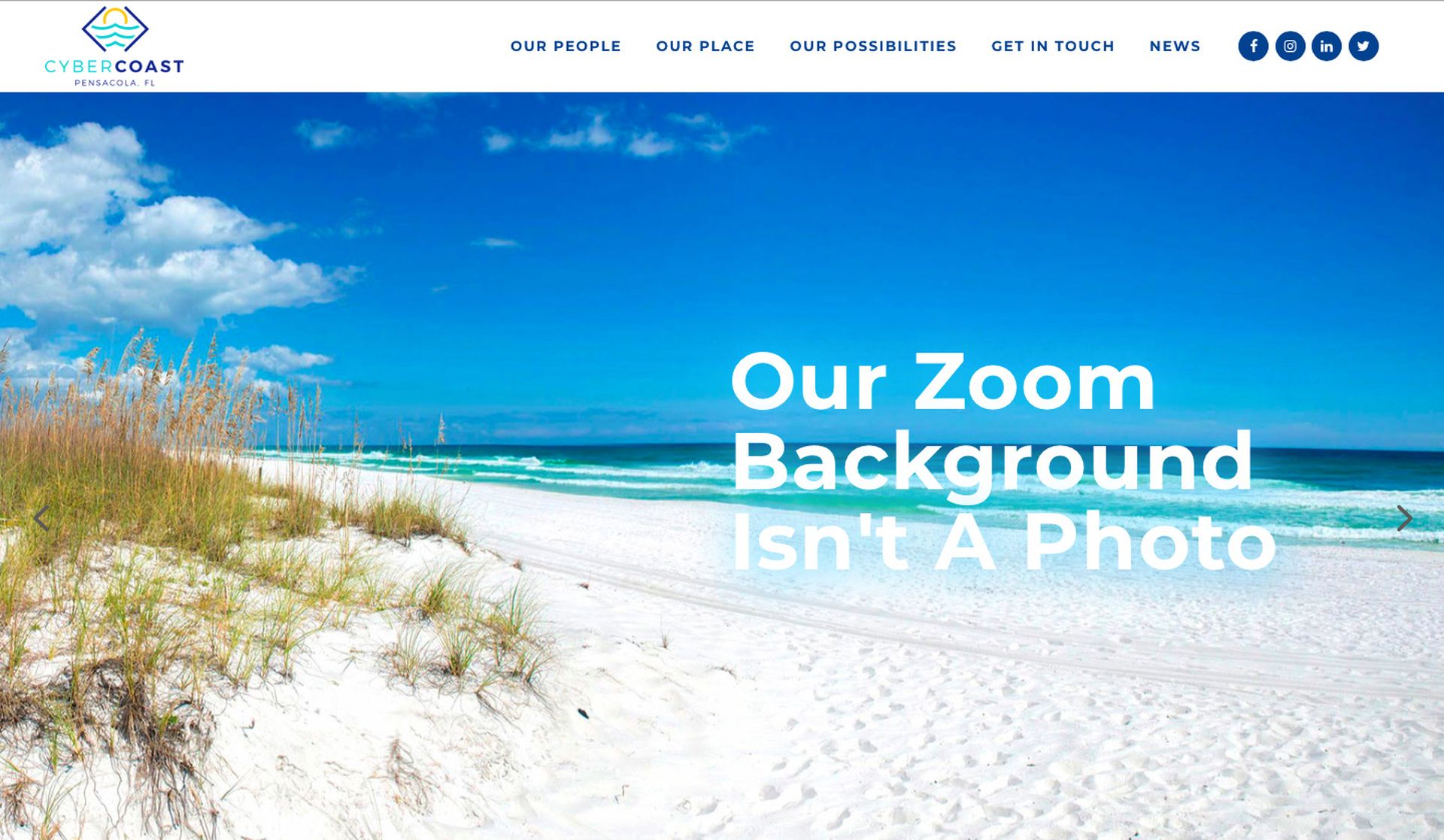Bolstered by the sweeping adoption of work-from-home business culture, the greater region of Pensacola last month launched an advertising and incentive campaign designed to lure top cyber talent away from Silicon Valley and other major tech hubs to the Florida Panhandle, where professionals can keep their old jobs while working remotely.
But that’s just part of a three-pronged strategy for recruiting talent. Selling sunshine, beachy backdrops and tax-free living, the city’s FloridaWest Economic Development Alliance is also encouraging infosec pros to apply for local jobs, while also enticing companies to move their operations to the region.
“We call it: ‘Bring your dog and we'll give you a job; bring your laptop and bring your own job; or just bring your company,’” said Sena Maddison, director of communications with FloridaWest.
As part of its new “CyberCoast” campaign, FloridaWest has launched a marketing website and social media ad campaign, and also started reaching out to local-area tourism boards, hotel operators and real-estate companies to procure lodgings and other incentives for qualified cybersecurity professionals so they can work remotely in the area as part of a week-long trial. The incentive portion of the campaign is still in its nascent stages, but the hope is that the laid-back lifestyle, beachfront scenery and local amenities are enough to convince some workers to stay for good.
FloridaWest hopes infosec pros are wooed by not only the warm weather, but also the financial benefits. “Because we are such a tourist state, we don't have any state income tax,” said Scott Luth, CEO of FloridaWest Economic Development Alliance, in an interview with SC Media. Luth said this can equate to a six-to-12 percent bump in take-home pay for doing the exact same job in a state where such a tax is levied.
Experts tell SC Media that other communities around the U.S. have adopted similar incentive programs to attract remote workers, especially those who desire to move to smaller, more affordable cities with perhaps a better quality of life.
Tulsa, Oklahoma, for instance, began its own incentives program for remote workers in November 2018, long before COVID-19’s emergence. “Tulsa Remote” imports talent into the city through a series of $10,000 grants that go to eligible remote workers or entrepreneurs outside of Oklahoma. (More than 375 members joined the program in 2020 alone.) Similarly, the Remote Shoals program offers tech workers up to $10,000 to locate to the Shoals community in northwest Alabama. However, these programs don’t specifically target infosec workers like CyberCoast does.
Meanwhile, on the northern border of the U.S., Michigan has also been seeking to build up its own remote cyber workforce.
“Prior to COVID-19, Michigan has worked to build a robust cyber ecosystem that includes a focus on talent and workforce development with an emphasis on jobs that could be done remotely, allowing our residents to live, play and work in their communities,” said Sarah Tennant, sector development director and strategy adviser for cyber initiatives at the Michigan Economic Development Corporation (MEDC). “COVID-19 has amplified this considerably, and we are seeing people relocating more and more to rural communities. We have built a foundation for this in Michigan and will look to grow existing program and create new ones in this post-pandemic world.”
As part of its efforts, the MEDC launched the Connecting Michigan Taskforce last fall “to help unify state initiatives around access to broadband,” allowing even more in-state workers to connect to their workplaces remotely, Tennant continued.
Known as the Cradle of Naval Aviation, Pensacola welcomes thousands of military recruits each year to Naval Air Station Pensacola, where they receive cybersecurity and cryptographic training. The area’s local high-school and higher-education institutions, including Pensacola State College and the University of West Florida, also offer cyber programs and curricula.
With a population of around a half-million, the city and its surrounding region are already home to offices for defense, aerospace and tech organizations such as Northup Grumman, Raytheon Aerospace, and Argo Cyber Systems, as well as a satellite office for the Department of Homeland Security’s Cybersecurity and Infrastructure Security Agency (CISA). According to the Haas Center at the University of West Florida, the Greater Pensacola region was home to 10,309 cyber-related jobs in 2019, with median annual earnings of $68,430.
As a result, “We’ve got a good, strong concentration of cybersecurity: companies and government contractors and federal [operations],” said Luth. “And so that’s really why we have targeted this specific niche… Obviously, cybersecurity is a huge growth strategy for us.”

Development Alliance
“What we're trying to do now is just build upon that,” Luth continued, compelling alumni, military academy graduates and skilled cyber employees to “consider coming here for jobs and growth opportunities.”
FloridaWest also has a strong idea of the kinds of companies it wants to add to its local tech and cyber hub. In particular, Pensacola wants to build a “public sector cyber cluster,” Luth explained. “And what I mean by that is… companies and operations that are protecting the city, county, state and federal operations and missions. To do that, obviously, [it’s] going to take growing our talent, retaining our talent and recruiting our talent.”
The need for cyber talent in the public sector was especially evident in December 2019 when Pensacola was struck by a Maze ransomware attack that shut down multiple city services. But according to the Luth, the incident in a strange way served as a showcase for growing cyber community here, as infosec specialists from CISA and other nearby organizations pooled their resources to respond to that event.
“Because of the strength of what we already have in the community… they were very quickly able to deploy those resources – basically walking across the street and supporting the city in its in its challenges that we had,” said Luth.
This community is important for persuading companies that the talent is there to move their offices to Northwest Florida, where certainly the operating costs of running a business are much cheaper than a major metropolitan area.
FloridaWest would love to replicate the results of one of Pensacola’s greatest success stories: the Navy Federal Credit Union. “They’ve probably got one of our largest cyber protection divisions here in the community just because of their size and scale,” said Luth. The financial services company has grown in size “from 400 people to 8,000 people here in Pensacola over the last eight years.”




